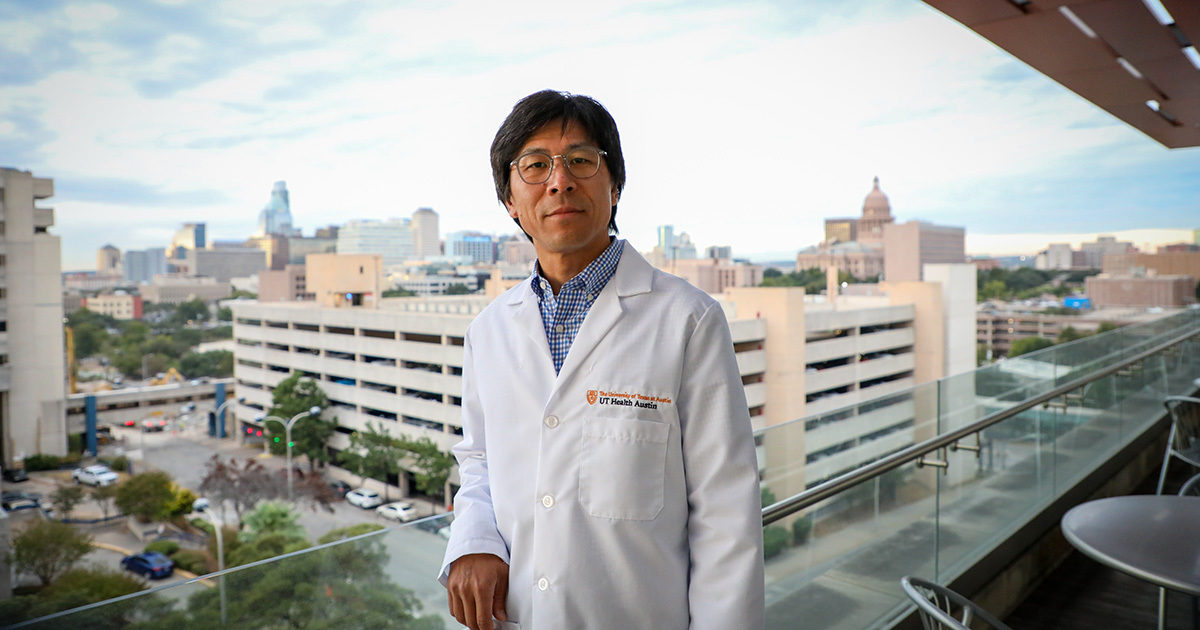What Austin Needs: A Blood Cancer Specialist
Reviewed by: William Matsui, MD
Written by: Abbi Havens

There were many motivations for board-certified medical oncologist William Matsui, MD, in UT Health Austin’s Livestrong Cancer Institutes, to pack up and move his skill set to Austin, Texas, but at the top of the list was his desire to expand the people of Austin’s access to specialized blood cancer care and build a program to fill an immediate need from the ground-up.
Dr. Matsui specializes in the diagnosis and treatment of patients with cancers that involve the blood, bone marrow, and lymph nodes (lymphoma). Additionally, Dr. Matsui is a professor in the Dell Medical School Department of Oncology and a courtesy professor in the Dell Medical School Department of Internal Medicine. He also serves as the Deputy Director and the Director of Hematological Malignancies Program for the Dell Medial School Livestrong Cancer Institutes.
“One of the most impactful benefits of bringing an academic medical center to Austin is providing the city specialized medical care, and now it’s going to get it,” says Dr. Matsui. Until Dr. Matsui help establish UT Health Austin’s Hematologic Malignancies specialty within the Livestrong Cancer Institutes, patients often had to travel to Houston to seek care, in some cases once a week for a chemotherapy treatment that takes one minute to administer.
“Blood cancers are individually rare but when you put them together, they add up. People in Austin need these services. Providing quality service to those who need specialized care should be at the forefront of what we bring to this city as an academic medical center,” explains Dr. Matsui. “Expertise in specialized subjects is the currency of a medical school, and having experts in their field brings the quality of every aspect of patient care up. For example, if our organization has a phenomenal heart surgeon, we’re going to need phenomenal cardiologists, phenomenal providers to care for patients after surgery, phenomenal health social workers and so on.”
Multiple myeloma is Dr. Matsui’s own specialty. It is a disease that affects plasma cells in the blood. In this type of blood cancer, malignant plasma cells collect in the bone marrow, pushing out healthy plasma cells that exist to fight infection in the body. These malignant cells produce an antibody called M protein, which can lead to impaired immune function, tumors, kidney damage and bone disease.
Although multiple myeloma is not often curable, impressive advancements in treatment of the disease have been made.
“I’ve been treating multiple myeloma for the past 15 years. Since I began, approximately ten new drugs have entered the market,” says Dr. Matsui. “The way we treat patients now is almost unrecognizable from how we treated multiple myeloma when I started my practice. With these advancements, patients live an average of twice as long.”
Dr. Matsui believes it is the responsibility of an academic medical center to continue to advance the treatment of blood cancer care through clinical trials and research. In the future, he expects to bring a bone marrow transplant program to Livestrong Cancer Institutes which will save the lives of patients with blood cancers that are not treatable with chemotherapy.
“A new and exciting practice involves taking immune cells out of a patient’s blood, then engineering them to attack the cancer, then giving them back to the patient. This is already approved for some patients with leukemia and lymphoma, but it is incredibly expensive and requires very specialized care. The process is very similar to that of a bone marrow transplant, so as our program grows, we hope to implement this as well,” says Dr. Matsui. “We are also going to begin to conduct clinical trials. In cancer treatment in general, but particularly in blood cancer treatments. Advancements made in recent years are unbelievable, and the only way to continue to push the field forward is through clinical trials. This is a hugely important part of an academic medical center.”
When it comes to treating the whole patient, not just the cancer itself, Dr. Matsui has never seen anything like the care team approach of UT Health Austin.
“Obviously I can handle treating the sickness itself, but if a person has a lot of other issues compounding their cancer and treatment, such as relationship problems, financial burdens, depression and so on, treating those issues is not necessarily my area of expertise. Here, we recognize each of these factors are equally important, and we need a well-rounded team to approach treatment. My colleagues are equipped to handle every single factor in a patient’s life, and I feel confident knowing my patients are taken care of,” shares Dr. Matsui.
“Austin is a city of great pride,” says Dr. Matsui. “Pride in our culture, history, diversity, university, and more.” With the introduction of the Hematological Malignancies Program at Livestrong Cancer Institutes, we can have pride in knowing that Austinites will receive the specialized blood cancer care they need and deserve.
For more information about the Livestrong Cancer Institutes or to schedule an appointment, call 1-833-UT-CARES (1-833-882-2737) or visit here.